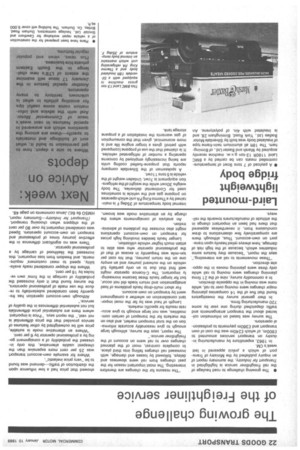The growing challenge of the Freightliner service
Page 24

If you've noticed an error in this article please click here to report it so we can fix it.
• The growing challenge to road haulage of the rail Freightliner service is highlighted in Transport for industry, the summary report of an inquiry published by the Ministry of Transport of which a précis appeared in last week's CM.
In 1963, expenditure by manufacturing industry on transport services amounted to 600m, of which £240m was the cost of own transport and £360m payments to professional operators.
The survey was based on information collected about the transport arrangements and traffic dispatched during one year by some 720 manufacturing firms.
In their general survey the investigators found that five of the 14 companies planning major changes were moving over to rail, while none was moving in the opposite direction.
In a commodity survey, nine of the 21 firms planning changes were moving to rail while only three were planning moves in the opposite direction.
-These movements to rail are interesting,". says the report, "because they feature some industries which, because of the high risk of damage, have always relied heavily upon transport on own-account Thus, although there are comparatively few observations to draw conclusions from, it nevertheless appeared that there had been an important change in the attitude of manufacturers towards the railways. -The reasons for the changes are therefore interesting. The most important reason for the past changes from rail were slowness and delays, followed by losses and damage, with increased rail charges falling into third place. In complete contrast, most of the planned changes over to rail were on account of the Freightliner service."
The report, says the survey, although large enough to give reasonably accurate information on the total transport market, and also on the markets for the transport of certain commodities, was not large enough to give accurate results for specific markets.
Length of haul was by far the most important consideration on whether a consignment went by transport on own-account.
For short multi-drop hauls problems of load amalgamation and return loads did not occur, but for longer hauls these became increasingly important. The C-licence operator might well find that due to an only partially full vehicle on the outward journey and an empty one on the return journey, that his cost per ton-mile was frequently in excess of that of the professional operator who was able to attain much higher vehicle utilization.
Longer hauls besides involving high prices for transport on own-account operations might also increase the problems of administration.
An analysis of consignments where the charge by an alternative mode was known, showed that price had a low influence upon the distribution of traffic—demand was found to be "very price inelastic".
Where for example own-account transport was 25 per cent more expensive than the cheapest usable alternative, this only increased the probability of a consignment going by a professional operator by 6 per cent.
"Where an alternative mode is suitable, price will be outweighted by other features of service provided that the price differential is not vast," the report says. "Price is important where there are substantial price differentials but not substantial differences in the quality of service."
Although own-account operation has frequently been considered substantially to reduce the use made of professional operators, the survey found that it only increased the probability of carriage in the firms' own vehicles by 16 per cent.
Where the shipper considered ready availability, speed to meet customers' requirements, and freedom from loss important, this increased the likelihood of carriage by a professional operator.
There was no significant difference in the effective journey times of professional and transport on own-account operators. Speed was considered important by over 80 per cent of the shippers when choosing transport.
(Transport for Industry—Summary report, HMSO 6s 6d.) Janus comments on page 48.








































































































